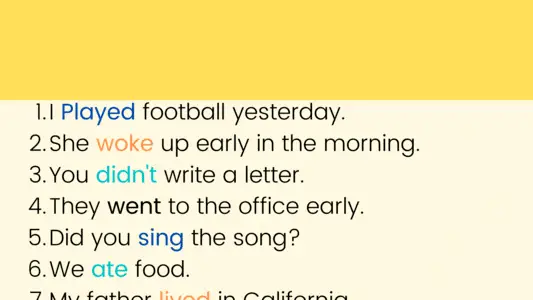The past simple is one of the most used verb tenses in English along with the present simple and the present continuous. So it is very important to understand it to improve conversational skills. In this way, you will make it much easier for you to understand whomever you are talking to.
That is why here we will show you everything about this verb tense, which is very easy to learn and use.
Affirmation
This is the simplest way since all you have to do is conjugate the verb in the past tense. It must be clear that there are two types of verbs: regular and irregular.
The basic formula would be subject + verb in the past + complement.
regular ones are the easiest to conjugate since they should only be added to the end of the verb in the infinitive -ed, -d (verbs with the ending “e”) or -ied (verbs with the ending “and”), depending on the letter with the let the verb ending. You may also be interested in what does wtw mean in texting
For instance:
I visited my family last summer. → I visited my family last summer.
He changed his job. → He changed his job.
I studied architecture at the University of Buenos Aires. → I studied architecture at the University of Buenos Aires.
Irregular verbs, in most cases, completely change their form. So it is necessary to take into account their conjugations. Next, we will show a small list with the most used irregular verbs.
Present past
Begin Begin Began
Can Could Power
Buy Buy Bought
Come Come Came
Eat Eat Ate
Forget Forget Forgot
Get Get Got
See See Saw
Think Think Thought
Do do did
Ser / Estar Am / Is / Are Was / Were
Let's see some examples:
Can I borrow your car tonight? → Can I borrow your car tonight?
I bought my car last summer. → I bought my car last summer.
I forgot to wash the clothes. → I forgot to do the laundry.
She went to the cinema yesterday. → She went to the movies yesterday.
It should be noted that the verb “to be” in the past simple is:
“Was” for she, he, I, it.
“Were” for we, you, they.
For instance:
She was confident. → She was sure of herself.
We were in Philadelphia yesterday. → We were in Philadelphia yesterday.
I was a doctor. → I was a doctor.
Negative
In the past simple auxiliary must be added, which in this case would be “didn't” (this is the contraction of “did not”), for all people, and then the verb must be put in the infinitive. The basic formula would be as follows:
Subject + didn't + infinitive verb + complement
For instance:
She didn't pass the exam. → She did not pass the exam.
Sam didn't know how to answer such a question. → San didn't know the answer to that question.
sentences-in-english-past-simple
Questions
To ask questions in the past simple, the auxiliary must be put at the beginning, as in all other verb tenses, and as in the previous case, the verb goes in the infinitive.
So, the basic formula would be: Did + subject + verb in infinitive + complement
For instance:
Did you go to the theater? → Did you go to the theater?
In most verb tenses, whether present, past, and future, adverbs are used. These manage to place you in time, so it is very important to take them into account for their use.
In addition, knowing them well serves so that tomorrow when you are reading a text, or watching a series in English, you know what verb tense the scene is about. In other words, they give you a clue so that you can better understand what you are seeing.
Some examples of these, which you can use in these types of sentences:
Yesterday. (Yesterday)
Last year / night / week. (year / night / last week)
Five minutes ago. (five minutes ago)
It beats. (late)
Learning the verb tenses is the most basic thing to get fully involved with the language. That is the reason why they are considered so important in the learning moment. With them, you will be able to speak, read and listen in a better way.
If you want to get a complete immersion with the language and learn the other verb tenses, then the English course offered by Wall Street English is perfect for you. With our blended method, which combines the use of technology for the development of the lessons and the interaction with our native English teachers, your learning process will be more fun and effective.
In addition, you can attend our Social Classes and practice your conversational skills, in a totally relaxed atmosphere. These activities are carried out in our center and on special occasions, they take place in bars, in the theater, etc. By attending these Social Classes you will be able to learn to function in English in real-life situations.





